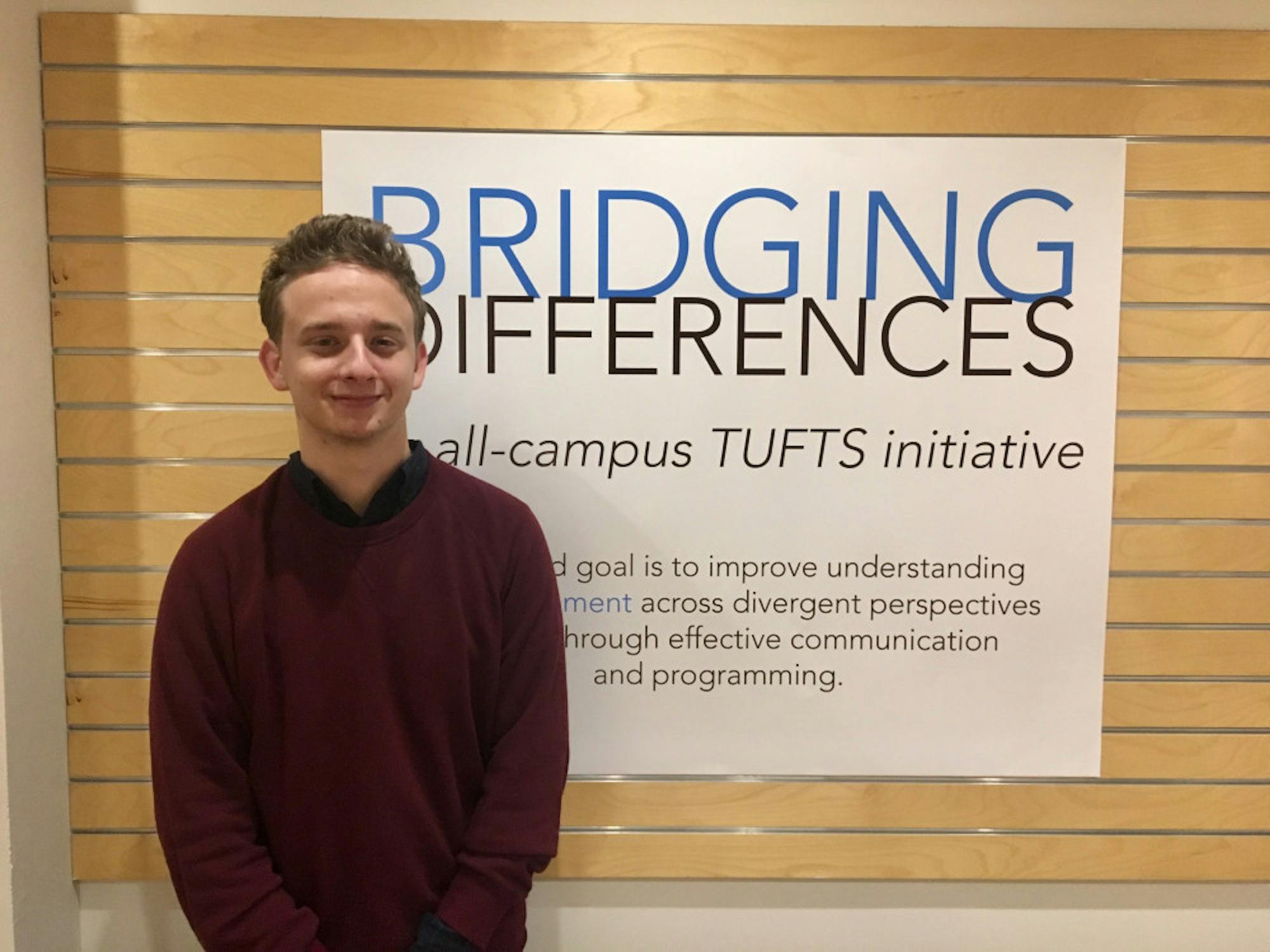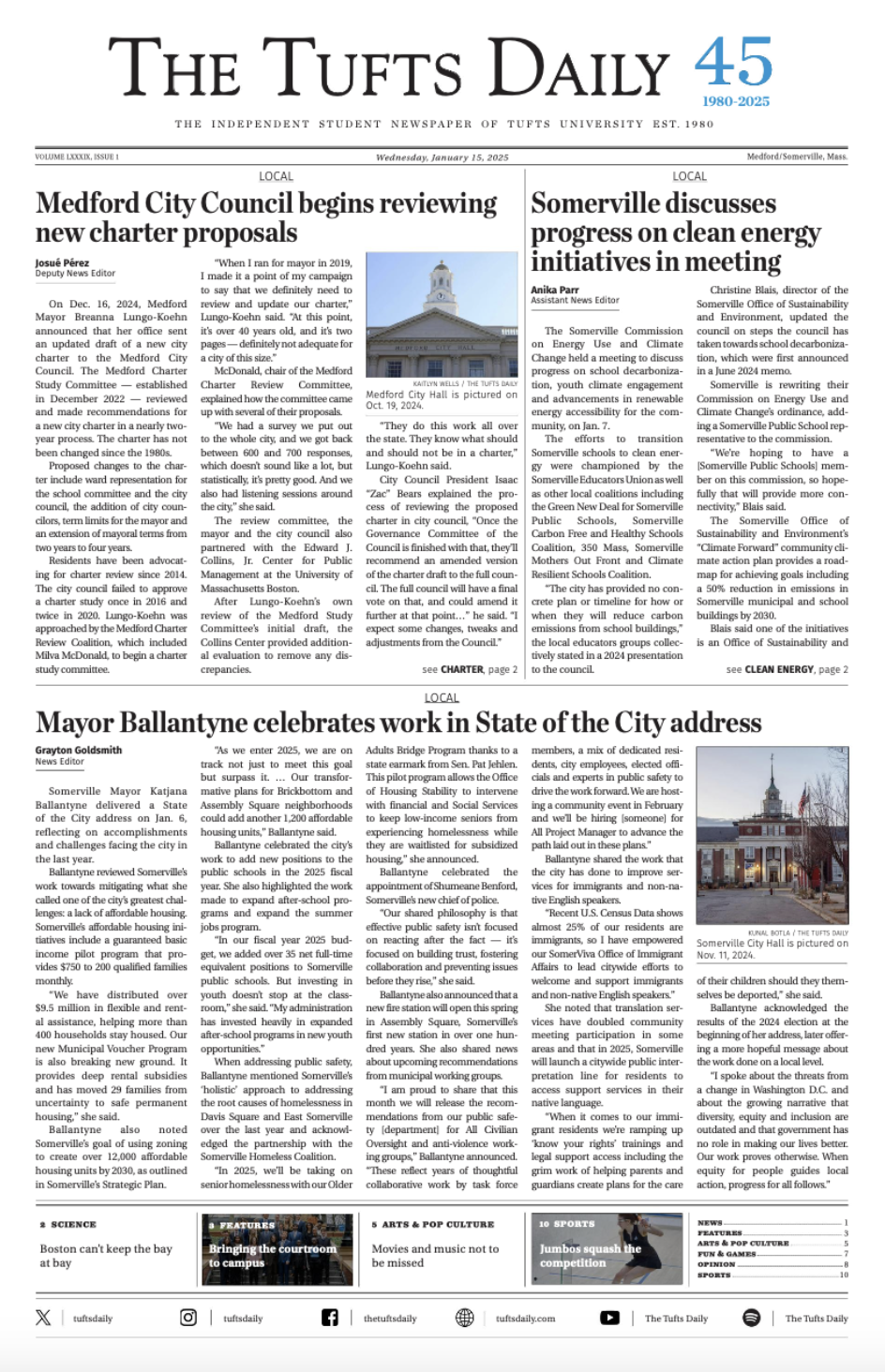Bridging Differences, a university-wide initiative, was launched in fall 2017 under the leadership of David Harris, former provost and senior vice president of Tufts, with a goal "to improve understanding and engagement across divergent perspectives at Tufts," according to its website. With the departure of Harris for the presidency of Union College in Schenectady, N.Y., this summer, the university's chief diversity officers and associate provosts Robert Mack and Joyce Sackey have become the initiative's co-chairs, according to a Sept. 10 Tufts Now article.
Through the initiative, Mack, who also serves as the associate dean for student success and advising, hopes to foster an inclusive environment where students and faculty are encouraged to grapple with perspectives and ideas that might be contrary to their own.
“In an increasing nationwide polarization and division, it is important to recognize and address the impact of [the] outside world on Tufts' community and its culture,” Mack said. “In this context, the initiative is designed to extend the university’s mission of diversity and inclusion while making sure that we remain thoughtful and respectful of each other’s differences as an institution.”
Sackey agreed with Mack.
"[The initiative] aims to promote greater dialogue and understanding among groups with different perspectives and lived experiences," Sackey told the Daily in an email. “We believe learning from one another and being open to perspectives different from our own strengthens our community.”
Zachary Intrater, a sophomore who is a part of the initiative as a student representative, noted that the task force is working hard to bring tangible changes to the community this year.
“Last year, the task force focused largely on assessing [the] Tufts community’s strengths and weaknesses in facilitating open dialogues across our four campuses. As it turns out, [the] Tufts community does a great job promoting dialogue within various groups. ... There are over 100 discussion groups at Tufts’ four campuses, ranging from the Group of Six ... to the faculty’s book discussion groups,” Intrater said. “However, many of these groups are largely stratified and there are not enough opportunities and venues for different groups to interact with one another and create understanding. The initiative will focus on bringing these different groups together by improving the inter-group communications and interaction opportunities.”
As the first institutional effort to create understanding among different groups on campus, the task force crafted a recommended reading list, Mack noted.
The Ginn Library’s website describes the reading list as having been “carefully chosen to encourage readers to delve deeply into the sensitive topic of diversity and to brainstorm about [questions such as]: What causes differences? Do we have a control over our differences? How can the gaps be bridged? What is the outcome of a diverse yet inclusive society?”
Mack added that books found in the reading list are available at displays installed at the university's various libraries.
On top of the selection of recommended readings, the initiative also successfully co-hosted the first “Tufts Table,” a new platform organized by Provost and Senior Vice President ad interim Deborah Kochevar, with the hope to bolster civic discourse and bipartisanship at Tufts.
“Tufts Table ... invites members of Tufts' community to share a light meal and discuss a wide range of complex local, national and global issues,” Mack said. “Last month, [the] Bridging Differences initiative co-sponsored this year’s first Tufts Table, which was [attended] by 65 members of our community, to learn how to engage in civil conversations on complex issues. Each table had a student who was trained to facilitate the discourse, and the university plans on having more of these events throughout the year.”
While working to increase the initiative’s visibility on campus, the task force also met on Sept. 27 to finalize the initiative’s mission statement, craft four subcommittees and allocate budgets for its future projects, according to Mack.
“The meeting last month was an opportunity for us to gather as a group and examine our goals for this year and [the] future,” Mack said. “Our revised mission statement reflects our goals more clearly, and our committees are now divided into four subcommittees that are in charge of the initiative’s budget, outcome evaluation, communication and planning, respectively."
Mack added that these smaller committees will allow for more individualized focus on different areas of the initiative, especially as the initiative grows.
Intrater said that the scope of “differences” the initiative attempts to bridge has expanded from its initial vision.
“The initiative began primarily as a response to the increasingly divisive political discourse on campus and nationwide,” Intrater said. “However, the initiative has become much more extensive, as we try to create understanding among different cultural, social, religious and racial groups on campus. A task force of chief diversity officers, [the] University Chaplaincy, Office of [the] Provost, students, faculty and staff reflects this institutional effort.”
Tufts Community Union President Jacqueline Chen, who also participates in the initiative as a student representative, noted that the differences can also include various divides on campus, especially between the student body and the administration.
“Serving the student government over the past three years, I noticed that students often have [a] vastly different vision and mission of the university from the administration or the Board of Trustees,” Chen, a senior, said. “Moving forward, I would like to see the initiative inviting our community members to have difficult conversations about what [a] Tufts education means to different groups of people and try to understand where each group is coming from.”
The Bridging Differences initiative will serve as an overarching institutional framework of various organizations on campus, such as Tufts Cooperation and Innovation in Citizenship (CIVIC), a non-partisan organization established in 2015 to promote open political dialogue, Intrater noted.
“This year, I serve on the e-board of CIVIC as a moderator and organizer of weekly meetings. Once I knew that I would be the moderator for CIVIC this year, I reached out to Provost Mack to join the initiative’s task force mainly to learn and research how to moderate dialogues on divisive topics and engage our community with diverse perspectives and ideas,” Intrater said. “Both CIVIC and [the] Bridging Differences initiative share similarities in their efforts to encourage Tufts' community to engage in difficult dialogues, instead of shying away from them.”
Intrater explained that between 50 to 80 students with a wide range of backgrounds and political affiliations participate in CIVIC's weekly meetings.
“One of my favorite experiences at CIVIC was last year’s meeting on abortion. We invited people to come from NARAL -- a pro-choice 501 organization -- and the Catholic community at Tufts,” Intrater said. “While it was a very contentious issue, both sides came with and shared their good intentions. I am not sure how much ... each side appreciates that aspect, but people came to listen and we were able to have a civic conversation on a topic that the rest of the country tends to merely politicize.”
On top of regular weekly meetings, Intrater added that CIVIC will host a debate on Thursday evening, where members from Tufts Republicans, Tufts Democrats and Left Unity Project will discuss topics ranging from climate change to cybersecurity and health care.
According to Mack, the Bridging Differences initiative hopes to foster an institutional framework for respectful civic discourse and mutual understanding across differences.
“College is one of the most critical time periods in one’s intellectual development, for it is the first time many leave their often homogeneous community, school system and family where they have cultivated a set of ideas and beliefs that define their values and ethics,” Mack said. “We hope that Tufts University can foster an environment where students continue to hold on to their values and beliefs, but also take the opportunity to learn about other values and perspectives as well, not in a right or wrong way, but in an empathetic way to expand their worldview."
Mack spoke to the importance of listening, talking and understanding the perspective of people from a wide range of cultures and communities while also taking into account the negative influences that discrimination and biases play.
Intrater similarly noted that it is important for students to carefully listen to others’ perspectives and reexamine their set of ideas and beliefs whenever necessary.
“I think no one ideology has a monopoly of good ideas,” Intrater said. “Personally, coming to Tufts and engaging with other perspectives, I embraced many ideas and thoughts that I did not hold before. After all, I learned that people who disagree often have similar intentions ... We all want prosperity, equality, individual liberty and security for us and the next generations. We may disagree on how to get to these goals, but we often have good intentions at our cores.”
The Bridging Differences initiative also hopes to set a tone for political, cultural, social, religious and racial dialogues on campus that can be sustained into the future, Mack said.
“It is important to recognize that [the] Bridging Differences initiative will be an ongoing committee to keep our missions and visions alive, as we know that this is not an objective that we can fully meet in just one year,” Mack said. “That is, new students, staff and faculty come and leave every year, and our community changes subsequently. Given that Tufts is an ever-changing and evolving community, we need to make sure to keep pushing ourselves equally hard so that everyone at Tufts has a place here and feel safe, while also is pushed to think outside of [their] comfort zone.”
Sackey said that they look forward to seeing how this initiative will unfold and influence the Tufts community.
“We plan to launch community-wide activities and will be calling on all students, faculty and staff to participate,” Sackey said. “My advice is to keep an eye out for announcements regarding these community activities and get involved.”
Mack also encouraged all Tufts students to engage with the initiative and share their thoughts, insights and perspectives on this growing effort.
Bridging Differences initiative extends university's mission of diversity, inclusion

Sophomore Zachary Intrater, student representative on the Bridging Differences initiative task force, poses for a portrait in Tisch Library on Oct. 21.





